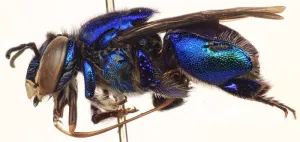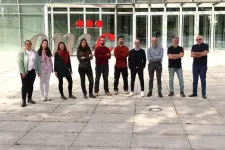(Press-News.org) LAWRENCE — A survey of orchid bees in the Brazilian Amazon state of Rondônia, carried out in the 1990s, is shedding new light the impact of deforestation on the scent-collecting pollinators, which some view as bellwethers of biodiversity in the neotropics.
The findings, from a researcher at the University of Kansas, are published today in the peer-reviewed journal Biological Conservation.
“This study on orchid bees was an add-on to previous research on stingless bees. Orchid bees are so easy to collect, so we added them to our broader survey of bee biodiversity across this rapidly developing region in the Amazon,” said lead author J. Christopher Brown, professor of geography & atmospheric science at KU. “We’ve known for decades that particular fragrances like eucalyptus oil, for example, attract male orchid bees, which naturally collect similar fragrances from orchids to use in mating. All you do is dip cotton balls into a variety of chemical attractants and hang these on a string in the open air. The bees start arriving in minutes, hovering around the baits and displaying their often metallic-hued blue and green colors.”
A specimen from the genus Euglossa collected during the study in Rondônia, Brazil.
Brown said that this ease of collection, in part, has made orchid bees, native to the tropical rainforests of the Americas, a regular subject of studies to determine the impact of deforestation and forest fragmentation on biodiversity. In a region of intense deforestation, the bees, because they are pollinators, help reveal the toll on local ecosystems more broadly.
“They were among the first types of organisms studied to understand the impact of that deforestation on the general biology and ecology of an area,” he said. The researchers identified species of orchid bee, Eulaema nigrita and 11 other species, that are particularly associated with degraded vs. preserved environments, respectively.”
Of the experience in the field with orchid bees, Brown said, “I had previously seen orchid bees in museum collections, but seeing them in the field was a wholly different experience. It’s breathtaking seeing these bees appear at the baits out of nowhere.”
Brown conducted all the fieldwork in 1996 based on a methodology developed with Marcio Oliveira, currently of the National Institute for Amazonian Research in Manaus, who was a fellow graduate student at the time.
“He suggested that, given our opportunity to collect stingless bees in Rondônia, we should also include orchid bees in our research,” Brown said. “To achieve this, we developed the methodology with the assistance of two young beekeepers from the region who temporarily abandoned their farming activities to join us in collecting bees throughout the state of Rondônia. Due to various commitments, publication was delayed. Fortunately, the scientific community appreciates the sharing of long-past data and observations.”
While the data concerns bees that lived decades ago, their scientific value remains high. In part, this is because the survey covered a much broader geographic area — the entire state of Rondônia — than previous studies of orchid bees. The researchers said their aim was to discover impacts on orchid bees beyond the scale of forest patches and fragments.
“Reviewers acknowledged the age of our data but commended the diversity of species we discovered and our unique methodology,” Brown said. “While conventional studies involve yearlong collection efforts in a handful of forest fragments, we sampled the bee population in 130 locations across the state in just an hour at each location. This unconventional approach revealed a wealth of bee diversity previously undocumented by others. Our results serve as an important baseline for future studies of biodiversity in the region.”
The survey revealed one of the most diverse communities of orchid bees ever found (2,497 individuals, represented by five genera and 48 species across 12 collection zones and 130 sample locations). A rare species of parasitic bee (Aglae caerulea), one that lays eggs in the nests of other species, was found along with two species that are new to science.
However, the researchers report their work revealed the “richness, abundance and composition” of the bee populations were “signficantly impacted by agricultural colonization after as little as 10-17 years of settlement by colonist farmers and ranchers.”
Brown said protecting orchid bee habitat and rainforests in general could largely be a matter of internal Brazilian politics and economics, but there were ways to boost their conservation.
“We are optimistic that stricter enforcement of environmental laws under Brazil’s new administration will lead to lower deforestation rates in the Amazon,” Brown said. “Additionally, there have been market-oriented strategies, such as the moratorium on purchases of soybeans from recently deforested land, that have slowed deforestation, an important finding from previous work published in PLOS ONE."
According to Brown, consumers largely are unaware of these conservation efforts because they are primarily organized at a high level involving agreements among large transportation companies, major soybean producers and large international environmental organizations.
“Our research highlighted the substantial reduction in deforestation resulting from these agreements,” he said. “In light of this, the question arises: What actions can consumers take? Many of these initiatives are led by prominent environmental organizations that wield influence with both industry and government. When these organizations yield tangible results, individuals may consider contributing to support their endeavors, particularly if the cause aligns with their interests and is scientifically backed. Such contributions can make a discernible impact.”
END
Deforestation harms biodiversity of the Amazon’s perfume-loving orchid bees
2024-04-10
ELSE PRESS RELEASES FROM THIS DATE:
Long-term satellite observations show climatological characteristics of isolated deep convection over the Tibetan Plateau
2024-04-10
The Tibetan Plateau is a prevalent region for deep convection owing to its unique thermodynamic forcing. Deep convection can exist as isolated deep convection (IDC), which is small in size, or mesoscale convective systems (MCSs), which are convective storms organized into larger and longer-lived systems. Most previous research has focused on MCSs over the Tibetan Plateau, but less so on IDC systems (hereafter, IDCs).
Dr. Ying Na from Wuxi University, and Dr. Chaofan Li from the Institute of Atmospheric Physics, Chinese Academy of Sciences, China, examined the climatological features of IDCs by using high-resolution satellite observations in June to September ...
Modeling viral evolution: A novel SIRSVIDE framework with application to SARS-CoV-2 dynamics
2024-04-10
Understanding the mutation and evolution of viruses (such as SARS-CoV-2) is crucial for effective public health management and response. Traditional epidemiological models often assume that viral transmissibility and pathogenicity remain constant during disease transmission, ignoring the fact that viruses continuously evolve through natural selection and random mutations. This simplification limits the accuracy of these models in predicting epidemic trends, especially when facing rapidly mutating viruses.
To overcome these limitations, ...
New data: UTSA economic development institute added $2.6 billion to Texas’ economy
2024-04-10
SAN ANTONIO, TEXAS — The Valdez Institute for Economic Development (VIED) at UTSA generated an overall direct economic impact of $2.6 billion for the Texas economy in 2023, according to the organization’s 2023 annual report, which was released Tuesday.
The latest figure represents the work of the institute’s portfolio of time-tested economic development strategies and new innovations that enabled business owners and entrepreneurs to start and grow their small businesses.
During the 2023 fiscal year, the institute:
Served 41,231 business ...
Waterproof ‘e-glove’ could help scuba divers communicate
2024-04-10
When scuba divers need to say “I’m okay” or “Shark!” to their dive partners, they use hand signals to communicate visually. But sometimes these movements are difficult to see. Now, researchers reporting in ACS Nano have constructed a waterproof “e-glove” that wirelessly transmits hand gestures made underwater to a computer that translates them into messages. The new technology could someday help divers communicate better with each other and with boat crews on the surface.
E-gloves — gloves fitted ...
BioOne presents 2024 BioOne Ambassador Award to five early career scientists
2024-04-10
BioOne proudly announces the 2024 recipients of the BioOne Ambassador Award. Now in its seventh year, this prestigious award recognizes early-career researchers in the biological, ecological, and environmental sciences who demonstrate creative approaches to science communication thereby fostering greater science literacy and aiding in the understanding of the natural world. BioOne Ambassadors are nominated by BioOne publishing partners, and each winning author will receive a $1,000 award and have their work promoted through BioOne’s multiple channels.
This year’s honorees are:
Dr. Elis Fisk – Draw and Learn: A Bighorn Sheep Mystery; nominated by The Wildlife ...
Thinking outside the doctor’s office: Poll looks at older adults’ use of urgent care, retail clinics and more
2024-04-10
When today’s older adults were growing up, urgent care centers and clinics inside retail stores didn’t exist. But most of them have now embraced these non-traditional sites for getting medical care, a new national poll finds.
In the past two years, 60% of people age 50 to 80 have visited an urgent care clinic, or a clinic based in a retail store, workplace or vehicle, according to new findings from the University of Michigan National Poll on Healthy Aging.
Urgent care clinics were the most ...
New mechanism discovered for the life-threatening arrhythmias in Andersen-Tawil syndrome
2024-04-10
A team at the Centro Nacional de Investigaciones Cardiovasculares (CNIC) has made a breakthrough discovery in the understanding of cardiac arrhythmias by unraveling the complexities of Andersen-Tawil syndrome (ATS), an extremely rare inherited cardiac disorder. Led by Dr. José Jalife, head of the CNIC Cardiac Arrhythmia Group, the study demonstrates that a specific genetic mutation (C122Y) in the Kir2.1 potassium channel alters the function not only of Kir2.1 but also of the main cardiac sodium channel NaV1.5, thus establishing a direct link with the life-threatening arrhythmias associated with ATS1.
The study, published in the journal Circulation Research, reveals that ...
Study suggests racial discrimination during midlife associated with Alzheimer’s disease pathology later in life
2024-04-10
WINSTON-SALEM, N.C. – April 10, 2024 – Racial discrimination experienced during midlife is associated with Alzheimer’s disease pathology, according to a new study from researchers at Wake Forest University School of Medicine and the University of Georgia.
The findings appear online today in Alzheimer’s & Dementia: The Journal of the Alzheimer’s Association.
“We know that Black Americans are at an elevated risk of Alzheimer’s disease and other dementias compared to non-Hispanic ...
The future of xenotransplantation is nearly here
2024-04-10
Embargoed until 10:30 a.m. Wednesday, 10 April, 2024 Central European Summer Time (GMT +2)
10 April, 2024, Prague, Czech Republic—Speaking today at the Annual Meeting and Scientific Sessions of the International Society for Heart and Lung Transplantation (ISHLT) in Prague, Muhammad Mohiuddin, MBBS, said xenotransplantation, hailed as the future of organ transplantation, is poised to become a clinical reality within the next several years.
In January 2022, the University of Maryland School of Medicine (UMSOM) became the first institution in the world to implant a genetically modified pig heart ...
Treating gum disease after heart rhythm ablation reduced risk of AFib recurrence
2024-04-10
Research Highlights:
Treating gum disease within three months after a heart procedure to correct an irregular heart rhythm, known as atrial fibrillation (AFib), may lower the chances of it reoccurring.
Inflamed gums may predict AFib recurrence after heart ablation, a procedure to fix the irregular heartbeat.
AFib patients should be examined for gum disease and encouraged to seek dental treatment, researchers said.
Embargoed until 4 a.m. CT/5 a.m. ET Wednesday, April 10, 2024
DALLAS, April 10, 2024 — Treating gum disease in the 3-months after a procedure to correct an irregular heartbeat known as atrial fibrillation ...







